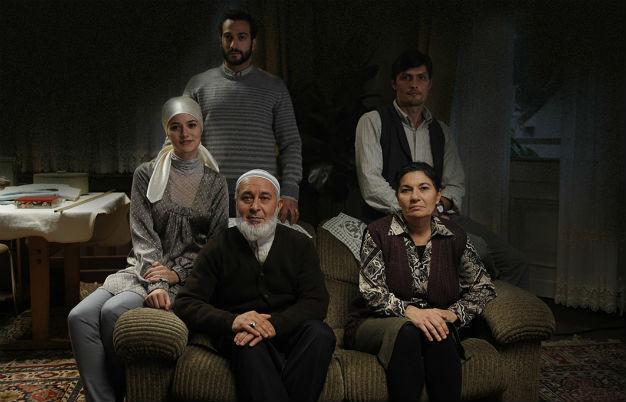World cinema welcoming refugees
Emrah Güler

The Berlin International Film Festival, or the Berlinale, has always been hailed as one of the most socially conscious film festivals in the world. Last year’s screening of “Fifty Shades of Grey” might have tarnished that image if this year was not one of the most politically-charged editions in the Berlinale’s history. The winner of the festival’s Golden Bear award, like many other films in the program, focused on the ongoing refugee crisis and the world’s refugees.
The Golden Bear went to Italian director Gianfranco Rosi’s documentary “Fire at Sea” (Fuocoammare), a haunting look at the fate of refugees trying to get to Europe through the Italian island of Lampedusa, which has for decades been one of the main routes for refugees entering Europe. “It’s not acceptable that people die crossing the sea to escape from tragedies,” Rosi said in his acceptance speech, while festival director Dieter Kosslick described the film as “a tribute to the world’s refugees.”
One of the competing films in this year’s Berlinale, Iranian-British director Rafi Pitts’s “Soy Nero,” looked at tension across the U.S.-Mexico border: A border that might not have made the headlines last year but has been a major source of conflict for decades. In the film, young Nero tries to get back from Mexico to the U.S., which he calls home.
Mahdi Fleifel’s short film “A Man Returned,” winner of the Berlinale’s Silver Bear Jury Prize, told the story of a troubled young man in Ain El-Helweh, the largest refugee camp in Lebanon. Born in Dubai, Fleifel himself was raised in a refugee camp in Lebanon.
Meanwhile, for a charity event at the Berlinale, Chinese artist Ai Weiwei decorated the pillars of the Konzerthaus with 14,000 bright orange lifejackets flown in from Lesbos, the Greek island where nearly half a million refugees arrived last year.
Legal and illegal immigrants in Turkish cinema
Turkish cinema is not new to portraying the legal and illegal immigrants, thanks to the “wirtschaftswunder” economic miracle of West Germany in the 1960s - which also marked the beginning of a culture clash that would be definitive in Europe in the coming decades. The flock of Turkish workers as guest workers to Germany, followed by their families, turned out to be not the greatest deal for Turkish workers: Harsh working conditions, the culture clash, and lost generations became some of the major themes of migrant Turkish cinema.
One of the first examples is perhaps the least known in Turkey, despite wowing viewers back in 1979 and winning an award in Sweden for its director, as well as two Golden Oranges in 1981. “Gül Hasan” (Hasan the Rose) is the only directorial work of the late stage, film and TV actor Tuncel Kurtiz. Starring some of the most renowned Turkish actors in their younger years - like Müjdat Gezen and the late Savaş Dinçer - the film explores the question of immigration and immigrants’ problems in Europe. Its main character is a director who defrauds Turkish citizens working in Europe with the promise of giving them parts in a film he’s about to shoot. “Gül Hasan” gives a sometimes funny, but always realistic, picture of the exploitation of migrants in Europe.
The film that brought Turkish-German filmmaker Fatih Akın both international acclaim and a Golden Bear in 2004, “Gegen die Wand” (Head-On), as well as 2007’s award-sweeper “Auf der anderen Seite” (The Edge of Heaven), established Akın’s name as the voice of third-generation Turks in Germany. “Head-On” was a heartbreaking love story of two people living in cultural purgatory between tradition and modernity, Turkey and Germany, survival and death. Drawing from his long past as a migrant in Germany, Akın recreated in “Head-On” the world of three generations of Turkish migrants in Germany.
In earlier years, the sad journey of a Turkish Alevi family from eastern Turkey to Switzerland as illegal immigrants won an Academy Award for Best Foreign Language Film in 1990. The Swiss director Xavier Koller’s “Journey of Hope” (Umuda Yolculuk) was co-written with Turkish writer Feride Çiçekoğlu. Meanwhile, another European production, Dutch director Ben Verlong’s 2010 film “Takiye: Allah’ın Yolunda” (In the Name of God) looked deep into the issue of investment scams, which has been a recurring problem for Turkish people living in Europe.
Perhaps now it is time for Turkish cinema to take a look at another side of the coin: The increasing number of Syrian refugees living in Turkey.
 The Berlin International Film Festival, or the Berlinale, has always been hailed as one of the most socially conscious film festivals in the world. Last year’s screening of “Fifty Shades of Grey” might have tarnished that image if this year was not one of the most politically-charged editions in the Berlinale’s history. The winner of the festival’s Golden Bear award, like many other films in the program, focused on the ongoing refugee crisis and the world’s refugees.
The Berlin International Film Festival, or the Berlinale, has always been hailed as one of the most socially conscious film festivals in the world. Last year’s screening of “Fifty Shades of Grey” might have tarnished that image if this year was not one of the most politically-charged editions in the Berlinale’s history. The winner of the festival’s Golden Bear award, like many other films in the program, focused on the ongoing refugee crisis and the world’s refugees.